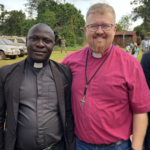
4 Ways Christians Respond to Homosexuality

When I told people that I was researching the subject of homosexuality for my doctoral project, there was generally a silence followed by one of four reactions: anger, surprise, curiosity, and shame. Much to my surprise, there was never a time when someone didn’t have a reaction. Homosexuality seems to be on everyone’s mind.
This was interesting to me because I didn’t realize how much emotional energy surrounding the subject actually existed. From my research, I knew that individuals who were struggling themselves with same-sex attraction experienced significant emotional distress. But I was not prepared for the emotional distress that seems apparent among every day people who appeared disconnected from homosexuality. So when I began sharing with people my thesis, inevitably an emotion was triggered.
Here are 4 reactions that seemed common to most people.
1. Some people became angry. The question underlining this reaction is, “Why did you write about ‘that’ subject?” Here the emphasis is on the word “that.” A person expressing anger generally seemed uncomfortable with the entire subject and couldn’t imagine why anyone would take an interest in such a topic. When I observed anger in a person, it typically seemed to be rooted in disgust. It seemed they always politicized homosexuality relating their grievances with society and government to individuals with homosexuality. Gratefully, I didn’t have to deal with disgust very often, but when anger manifested, it took time to settle the person down and try to answer their question.
2. Some people were surprised. This is slightly different from the first reaction. Here their emotion, like the first, was based on some form of discomfort. But the discomfort didn’t rest in my chosen research, but an underlining worry that perhaps at one time in my life I struggled with same-sex attraction. This was comical to me. After all I have been happily married for fifteen years and have accumulated three children. Was I now going to reveal some secret hidden from long ago?
The opposite was also true. People wondered what connection could I possibly have with same-sex attraction? The fact of the matter, homosexuality now affects all of us whether we accept that or not.
3. Some people were curious. I loved this reaction because it generally precipitated a healthy discussion on the issue. I didn’t have to explain “why” I chose same-sex attraction, but rather I could launch right into a conversation with people who showed genuine concern. These conversations were rich and rewarding. While the ethical considerations are still hotly contested, the person who exhibited curiosity was typically genuinely concerned and was seeking honest answers to difficult questions.
4. Many people expressed shame or sadness. To my surprise, there was more people in this category than the rest. Homosexuality is now a part of our mainstream culture. But at the local level people are still struggling with what to think. Generally speaking when people expressed shame or sadness, I could tell they needed to share something with me. Their voices softened, heads tilted down, and they very often looked nervously around as they shared their hurts and heartaches with me. Sometimes the person was personally struggling with same-sex attraction. More often the peopled I encountered had friends or family members who had identified as being “gay” and were now wrestling with the implications. The unresolved tensions in their relationships resulted in profound sadness.
All four of these reactions to homosexuality have something in common. They are real and genuinely being felt in our communities. Even deeper, these reactions reveal the nature of our faith, define how we relate to each other and have far reaching consequences about the way think about God, ourselves, and others. Understanding, disentailing, and finding resolution has been the heart of my work. We need honesty. We need bravery. We need Jesus.




